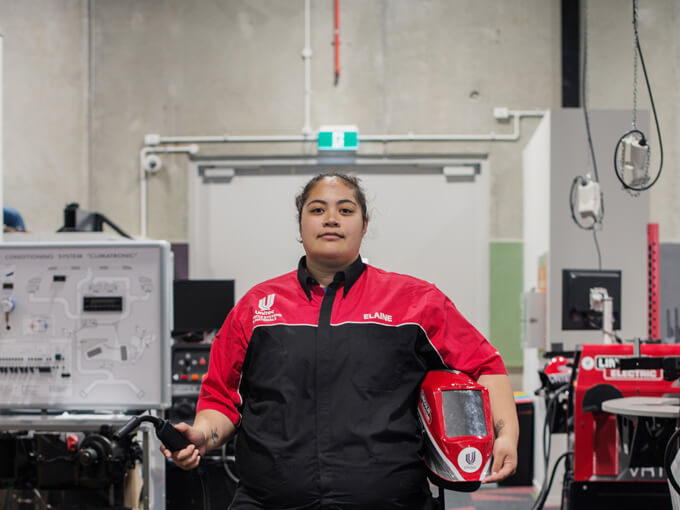Jan 26, 2018 Schools
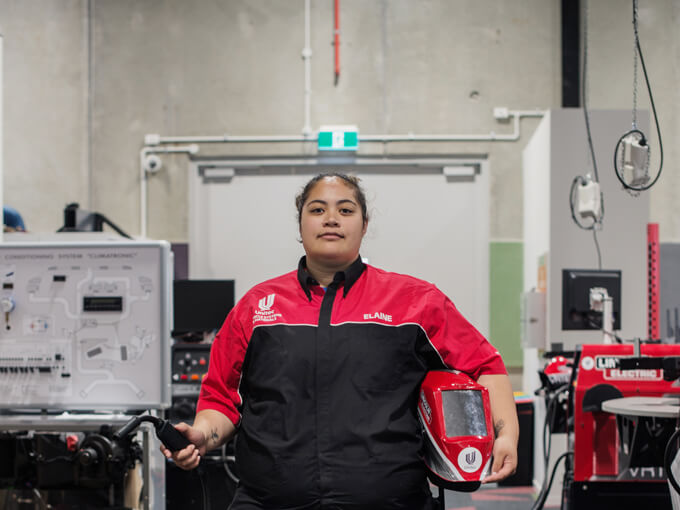
New Zealand’s construction sector is in desperate need of skilled workers, and with the new government’s promise to build 100,000 high-quality and affordable homes, these workers can’t come quick enough. At Mataaho, Unitec’s new trade training facility, we meet some of the next generation.
Elaine Pereira
28 years old
What are you studying?
I’m doing a Level Four Certificate in Applied Technology, majoring in Autotronics – that’s automotive electronics.
Why do you think New Zealand is currently experiencing a shortage of skilled workers in the trades sector?
I don’t think it [the skills shortage] has been advertised enough prior to this recent push for more trades workers. It’s been a while since I was at school, but it was never something that was interesting enough for students to look into doing. There was an engineering class at my high school, but only the boys were in it. I think people are now moving into trades because of more advertising, government support, and scholarships that are available.
Why are you studying?
I spent nearly 10 years in customer service and decided that I needed a career change last December. From coming into Unitec only knowing how to change oil and check my tyre pressure etcetera, I’ve now gained a new understanding of the complexity of vehicles and the different things that an engine does. Not only do I have the theory side in class and on the simulation boards, I get to go and get dirty and have a play around on the cars downstairs too.
Any plans for once you have graduated?
I have been applying for apprenticeships. I am currently employed with Toyota as a car groomer. That’s an entry-level job, so hopefully it’ll lead into an apprenticeship. If I work hard and build a reputation for myself, I’ll hopefully move on to become a master technician one day.
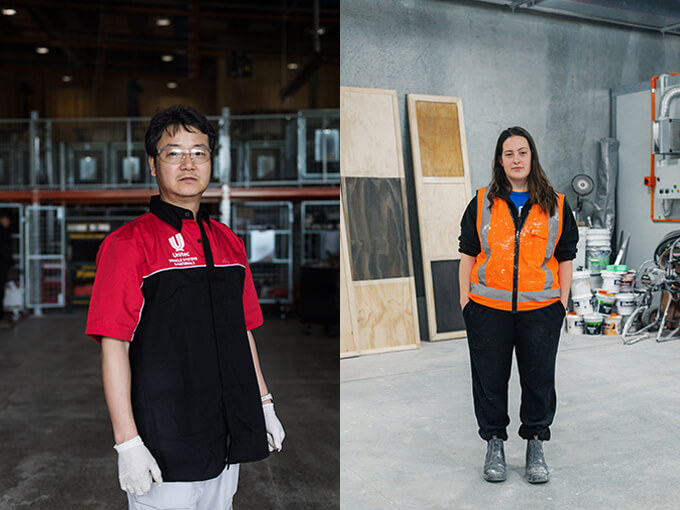
Dongkyung Shin
43 years old
What are you studying?
Automotive engineering.
Why did you choose to study that?
I have 23 years’ worth of industry experience. I have already applied for jobs in New Zealand, but when I applied, it was very hard to find someone willing to hire me. I believe it’s mainly because I am an immigrant – paperwork and language barriers are what prevented me from being hired. They wanted me to have some form of qualification recognised here in New Zealand.
What has studying here given you?
The ability to prove to potential employers that I am knowledgeable and skilled in my trade. I can show them that I am New Zealand-qualified and trained.
Any plans for once you have graduated?
I want to join the industry here in New Zealand and eventually own my own business at some point in the future.
Georgia Heslop
18 years old
What are you studying?
A certificate in Allied Trades.
Why did you choose to study that?
I’ve always been interested in the trades – being outside and being creative and looking at something you’ve built and feeling that sense of accomplishment has always been something special to me. Before I came to Unitec, I had never touched a power tool. I kind of just bit the bullet and said to myself, “this is something that you are going to enjoy, and already do enjoy, so just go for it.” I had tossed up between Allied Trades and Carpentry, but then I thought about it and knew that I wanted a broad base to be able to use. I applied and yeah, here I am.
Why do you think New Zealand is currently experiencing a shortage of skilled workers in the trades sector?
Coming from my own generation’s perspective, I think that it’s that people don’t want to do as much nowadays. I look at my friends, their friends, and they just don’t have that same drive to want to go out and do something. Personally, I don’t know why that is – societal issues or something along those lines perhaps? People in my generation just don’t have the same drive to go out and learn and thrive and make their own life. They kind of just want to do nothing. Personally, I’m not one of those people.
What has studying here given you?
I’ve learnt so much since I’ve been here. I’ve also been learning to love things that I thought I’d never love. I never really thought that I’d want to paint or want to build floors. I kind of thought, “oh, I’ll just put up the framing and be outside sitting around waiting for smoko,” but it’s so much more than that. Seeing everything progress is just so cool. With the tutors and the class’ collaboration, it adds to that sense of accomplishment because you’ve built something that you never would have dreamed of building by yourself.
Any plans for once you have graduated?
Once I graduate, I’ll probably go into a carpentry apprenticeship. My plan’s to go into building, but this course is so broad that I could go into plumbing, painting, electrical, or plastering – it’s crazy. My options are really open so if I don’t like building, I can go and get an apprenticeship somewhere else.
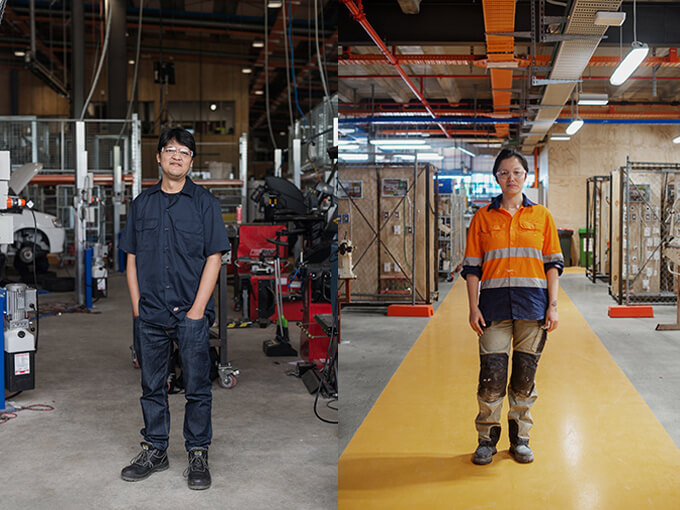
Joel Iglesia
41 years old
What are you studying?
Automotive engineering.
Why did you choose to study that?
I love cars. When I was in the Phillipines, I would fix my own car. I wanted to deepen my understanding of engines and so on, so that’s why I chose to study what I do.
Why do you think New Zealand is currently experiencing a shortage of skilled workers in the trades sector? Take engineering for example – I don’t think the value of the career path has truly been shown.
Any plans for once you have graduated?
I’ll probably return to study again. Hopefully a Bachelor’s Degree.
Jia Jia Chen
37 years old
What are you studying?
I’m studying a Trades Certificate; it’s kind of like a multi-skilled building certificate. It’s full-time over 26 weeks. We do some carpentry work and then branch out to other trades like electrical wiring, painting, and even cabinet-making.
Why did you choose to study that?
It’s something different. I’d been thinking about doing this for many years. I originally come from a nursing background, actually having done my nursing training here at Unitec. I love to create things and use my hands.
Why do you think New Zealand is currently experiencing a shortage of skilled workers in the trades sector?
Probably because it’s a hard trade to learn. Also, maybe it’s because it’s a male-dominated industry. Females don’t really see themselves as a part of the industry, so that’s half of your labour pool gone. I know a lot of people go to Australia because it’s paid better. Maybe it’s supply not meeting the demand since the housing increase.
Any plans for once you have graduated?
I’m still thinking about that, but I think anything is possible. I never took this course with the intentions of getting a job from it. I really just want to do my own DIY thing around the house.
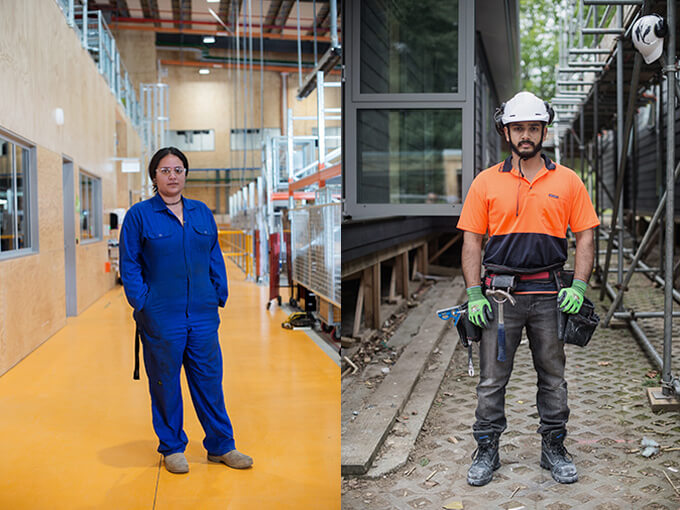
Rose Bervang
23 years old
What are you studying?
The New Zealand Certificate in Automotive Engineering, Level 3.
Why did you choose to study that?
I was in hospo [hospitality] for about eight years. I wanted to be a barista technician for a little while and then I found a new love for cars. I’ve always loved old-school cars – I’ve got a couple at the moment and I just wanted to know how to modify them.
Why do you think New Zealand is currently experiencing a shortage of skilled workers in the trades sector?
I’m not really sure. I think a lot of people are scared to try something new. That was my fear when coming to this course – that I would be the only person who didn’t know anything about cars. But coming here, I’ve found like-minded people who are beginning at the same level and are also very supportive.
Any plans for once you have graduated?
After this certificate, I’m moving up to Level Four. After that, I’ll be a qualified mechanic then I’ll be majoring in heavy diesel mechanics. I’ve already got an apprenticeship set up at Scarbro Construction. Eventually, I’ll travel with the skills I have.
Charles Senevirante
24 years old
What are you studying?
A New Zealand Certificate of Carpentry.
Why did you choose to study that?
My sister has an architectural background and she’s gone back to uni to study property law. Me, my dad, and my sister were having a discussion a while ago about it all. Seeing that I was okay with my hands and some building skills, if I learnt all of the technical skills required to build, we would have a pretty good pool of skills between us all.
Why do you think New Zealand is currently experiencing a shortage of skilled workers in the trades sector?
With the current generation, I feel their parents are from an era where having a trade wasn’t as valued as much as it is now. As a result of that, more effort is put into encouraging people into professional degrees and things like that. Because of that, I think people assume that the money is going to be better elsewhere and are more reluctant to get involved in a trade because of a fear that they might not be financially stable.
Any plans for once you have graduated?
Probably get an apprenticeship. Once that’s over, work as a builder until I become fully qualified and then work for myself.
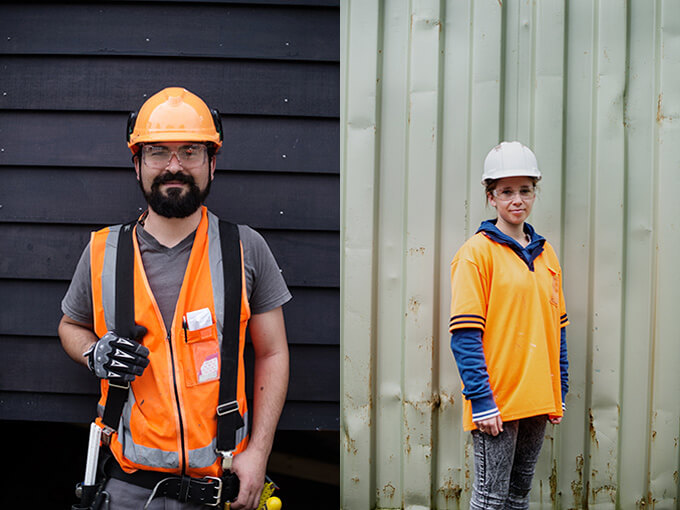
Michael Moore
32 years old
What are you studying?
I’m studying the Certificate in Applied Carpentry.
Why did you choose to study that?
I’ve always liked active jobs. I’m not really a sit-down type of person. It’s something I had thought of over the years and I was at that point where I decided to give it a go. I thought that this would be a really good place to start.
Why do you think New Zealand is currently experiencing a shortage of skilled workers in the trades sector?
I think part of it is that people aren’t really encouraged to go down that [trades] path. I think there’s perhaps a bit of looking down upon it [the industry]. It’s not as valued as much as some other career options like a banker or lawyer. There’s been no emphasis for such a long time. Now we’ve hit crisis point it’s like “dang, there’s not enough people.”
What has studying at Unitec provided you with?
It’s provided me with really good structure. The tutors have been really good, I’ve found that really helpful. It’s been really interesting going in with not a great deal of knowledge about how things come together. Learning all of that step-by-step has been really helpful.
Any plans for once you have graduated?
Just get out there and build really. I’ve got a whole bunch of ideas really, but you’ve got to start somewhere and do the “hard” time first.
Tina Martin
27 years old
What are you studying?
Applied Technology in Carpentry.
Why did you choose to study that?
I’d been working as an architectural technician for five or so years – I got my degree in architecture a while ago. I wanted to do the carpentry course to become a better detailer and understand more about how a building actually comes together. By actually building it, you get a better understanding rather than just doing it on the computers.
Why do you think New Zealand is currently experiencing a shortage of skilled workers in the trades sector?
If people haven’t had the opportunity to complete some form of study, it does make it hard to get a job in the industry. A lot of people say “you have to have X amount of experience, or have a formal qualification to be able to get a job” and with no experience, you’re not going to get the job. Without the job, you’re not going to get any experience.
What has studying here given you?
It’s definitely given me a much greater appreciation for how a building is put together. I came from designing and building things just on a computer. Working like that, you kind of just assume that everything will come together and work, because the computer says it does. That’s not the case. Once you’re on the site, you discover the issues, and go, “okay. I need to change this. I need to change that.” For me, it’s definitely been about becoming a better detailer.
Any plans for once you have graduated?
Well, I’m a lecturer at Unitec at the moment. I’ve been working as a lecturer during semesters one and two in construction, building, and architectural technologies. So next year, I’m hoping to still be a lecturer and still be able to teach in construction. This course has really helped me with that as well. I’ve taken the knowledge that I’ve gained and have given it to my students.
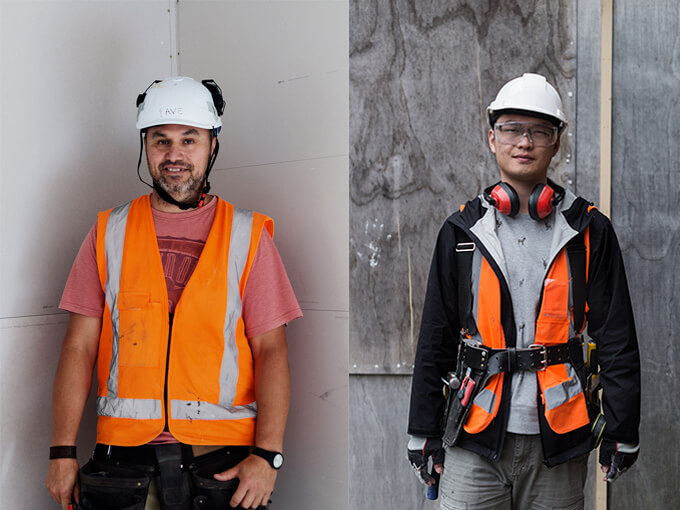
David Simpson
48 years old
What are you studying?
In short, building and carpentry. It’s full-time, three days a week, for one year.
Why did you choose to study that?
I just wanted a change of career. I saw this growing housing shortage in New Zealand and thought, “if there’s something I can do about it, I’ll do it.”
Why do you think New Zealand is currently experiencing a shortage of skilled workers in the trades sector?
Going back 10, 20, maybe even 30 years ago in our country’s history, New Zealand had a good apprenticeship scheme set up for our young people to look at as a viable career option. That scheme has since been phased out, almost forgotten about. We’re now paying the price for that. Now we’re kind of in catch-up mode.
What has studying here given you?
It’s provided me with another choice apart from nine-to-five office work, which I’ve been doing for the last 20-plus years. Now I can go out there and do a job that’s a bit more hands-on and creative, plus I can give back to the community in a real, solid, three-dimensional way.
Any plans for once you have graduated?
To work, I haven’t worked this year. Also to upskill myself and become fully qualified.
Jason Liu
27 years old
What are you studying?
Carpentry, it’s a one-year course.
Why did you choose to study that?
My cousin is in the building industry, so he introduced me to the possibility of doing the same work.
Why do you think New Zealand is currently experiencing a shortage of skilled workers in the trades sector?
I think that maybe New Zealand’s building industry has developed too fast. The workers need skills and that takes time. It’s created a shortage. I think it takes four years to have your licence. It’s only my first year, which means that I still have three more to go.
What has studying here given you?
It’s nice that we [the students] can work on-site. We work together and communicate well with each other. I can also practise the “scary” stuff, which eliminates some risk for me.
Any plans for once you have graduated?
Working in the industry. It’s a part-time course, so they encourage us to get some work in the industry as well.

